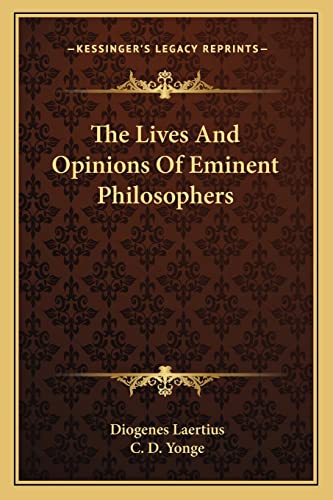

He was thus enabled to send the votive offering. When the victory was won, being in sore straits for gold, he despoiled the women of all the ornaments which he had seen them wearing at some local festival. Ephorus records his now that, if he won the victory at Olympia in the chariot-race, he would set up a golden statue. § 1.96 Aristippus in the first book of his work On the Luxury of the Ancients accuses him of incest with his own mother Crateia, and adds that, when the fact came to light, he vented his annoyance in indiscriminate severity. Nevertheless, I will come, to be entertained by you and to make your acquaintance." There will be no advantage to me in a journey to Sardis, for I am not in want of money, and my possessions are sufficient for my friends as well as myself. "You bid me come to Lydia in order to see your prosperity: but without seeing it I can well believe that the son of Alyattes is the most opulent of kings. The following short letter is ascribed to him: The exercise he took was grinding corn, as related by Clearchus the philosopher. For he had married a wife superior in birth to himself: she was the sister of Draco, the son of Penthilus, and she treated him with great haughtiness.Īlcaeus nicknamed him σαράπους and σάραπος because he had flat feet and dragged them in walking also "Chilblains," because he had chapped feet, for which their word was χειράς and Braggadocio, because he was always swaggering Paunch and Potbelly, because he was stout a Diner-in-the-Dark, because he dispensed with a lamp and the Sloven, because he was untidy and dirty. § 1.81 The advice seems to have been prompted by his situation. And so, if things are going well, religion and legislation are beneficial if not, they are of no avail. For religion and legislation are not sufficient in themselves to benefit cities it can only be done by those who lead the multitude in any direction they choose. "It seems that after all I was not to confer much benefit on Athenians by my laws, any more than you by purifying the city. Then you have no one to fear, and need not banish any one." But if you must at all hazards remain tyrant, endeavour to make your mercenary force stronger than the forces of the city. The best course would be to resign power, and so be quit of the reproach.

He would earn the gratitude of the city who found out that you had no suspicion. A conspirator against you might arise from a quite unexpected quarter, say, one who had fears for his personal safety or one who disliked your timorous dread of anything and everything. You must lose no time if you want to get rid of them all. § 1.64 "You tell me that many are plotting against you. It was in bad taste, he urged, to increase the rewards of these victors, and to ignore the exclusive claims of those who had fallen in battle, whose sons ought, moreover, to be maintained and educated by the State. He curtailed the honours of athletes who took part in the games, fixing the allowance for an Olympic victor at 500 drachmae, for an Isthmian victor at 100 drachmae, and proportionately in all other cases. Lysias, however, in his speech against Nicias ascribes this law to Draco, and to Solon another depriving open profligates of the right to speak in the Assembly. Again, not to have a settled occupation is made a crime for which any one may, if he pleases, impeach the offender. He seems to have enacted some admirable laws for instance, if any man neglects to provide for his parents, he shall be disfranchised moreover there is a similar penalty for the spendthrift who runs through his patrimony. To return to Solon: one of his sayings is that 70 years are the term of man's life.


 0 kommentar(er)
0 kommentar(er)
